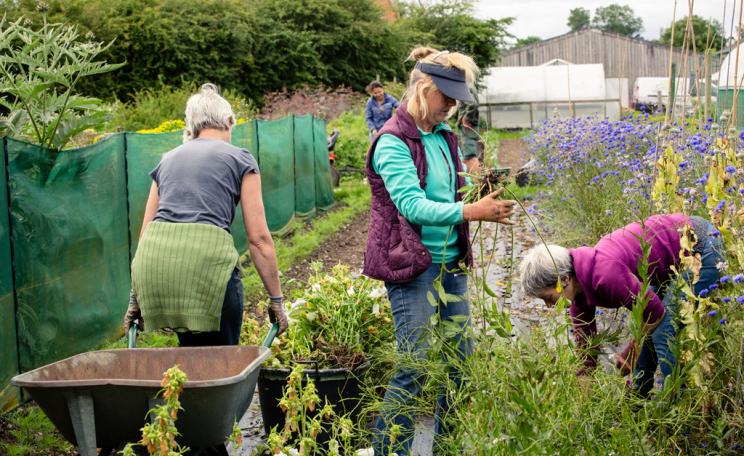Growing your own and grabbing a slice of the Good Life is more popular than ever. Indeed, in a recent survey Garden Organic carried out with UK garden owners, a staggering 68 per cent admitted to using their gardens to grow vegetables and almost 45 per cent claimed that being more self-sufficient and living the Good Life is what motivates them to garden. Great you might think – all these gardeners across the country doing their bit to live cleaner and greener. However, this doesn’t really paint an accurate picture of what’s happening in reality.
In their quest to live the Good Life, made so appealing by celebrity gardeners and chefs, many amateur gardeners are actually inadvertently doing more harm than good to the environment and living what we have defined as the ‘Good Lie’.
This is because to sow tasty vegetables and grow beautiful plants, the equivalent of over 24 million wheelbarrows of endangered peat is used unnecessarily by amateur gardeners every year in the UK, largely in the form of multi-purpose compost.
Peat is used in compost and soil improvers because it’s cheap, light, retains moisture and stores nutrients. However, in extracting peat from its natural home, its ability to store four times as much carbon as forests is lost.
Consequently, 400,000 tonnes of carbon dioxide is released into the atmosphere every year, while a vital habitat for rare birds, dragonflies, butterflies and plants is needlessly destroyed.
In fact, the UK’s staggering levels of peat consumption means that all but a tiny proportion of our natural peatlands have been wiped out forever. We believe this is a high price to pay, especially as it’s completely unnecessary – we know this to be true because our members have been gardening successfully without peat for over 50 years.
Behind the labels
It’s fantastic that more and more people are getting into gardening at home, but it’s important that we all think beyond our back yards and give more consideration to the wider impact of our buying decisions. Despite gardeners’ Good Life intentions, our research showed that when it comes to purchasing products to achieve the self-sufficiency dream, ‘eco’ motivations are quickly forgotten.
It's what's best for gardeners’ pockets, not the planet, that’s the most powerful influencer, with three times as many respondents choosing low prices and special offers as the deciding factors of which products to buy, as opposed to what’s best for the environment. This marked contrast is also reflected in the products gardeners buy, with around three times as many choosing multi-purpose peat-based composts over peat-free alternatives.
While it's gardeners who are the end-users, we feel strongly that retailers and manufacturers should shoulder a large responsibility for the UK's high peat usage. Limited peat-free alternatives and misleading on-pack claims are undoubtedly adding to the problem.
Our members are constantly telling us that on-pack statements such as ‘30 per cent peat-free’ are confusing because they don’t make it immediately obvious that products still contain a high percentage of peat.
With our research highlighting that 65 per cent of gardeners rely on packaging and display information to pick products, there is no doubt in my mind that retailers and manufacturers are ideally placed to make us all more aware about the impact of our buying decisions through clearer labelling, information on where peat comes from, and better access to a wider range of peat-free products.
To raise awareness of the extent of the problem and to encourage gardeners to stop using peat products in favour of environmentally friendly alternatives, we have launched the ‘I Don’t Dig Peat Campaign’.
Through our dedicated website, www.idontdigpeat.org.uk, we’re encouraging amateur gardeners to take action now and make the ‘Peat-Free Promise’. We’re also using the site to educate people on how to garden successfully without peat, and visitors can access a whole host of information about peat-free alternatives, such as leaf mould and composted bark, and simple peat-free compost recipes that they can make themselves at home.
The message is simple: get behind the fight for peat-free gardening and together we can make a difference, but we have to act fast and we have to act now.
For more information about Garden Organic’s ‘I Don’t Dig Peat’ campaign and to make the Peat-Free Promise, visit www.idontdigpeat.org.uk
Bob Sherman is chief horticultural officer at Garden Organic
| READ MORE... | |
 |
REVIEW How to Make and Use Compost: The Ultimate Guide Drawing from 40 years of composting experience, Nicky Scott's latest book will inspire confidence in beginners and give new techniques to veteran composters |
 |
GREEN LIVING Top 10…gardening blogs From planting tips to making your own 'seed bombs', Tom Antebi has the lowdown on the web’s best organic gardening blogs |
 |
GREEN LIVING The Poetry of Compost Your compost heap can be an untapped powerhouse of energy, says Paul Kingsnorth - it's just a matter of learning to harness it |
 |
GREEN LIVING Super nature: creating a wildlife garden From birds to dragonflies and butterflies to bees, Hazel Sillver explains how to turn your garden into a haven for wildlife |
 |
GREEN LIVING Help save Britain’s birds From buying a nest box to keeping Mr Bigglesworth under control; there are plenty of ways in which you can help the UK’s bird population |





